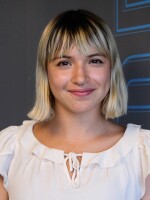LULU GARCIA-NAVARRO, HOST:
When coronavirus cases spiked in March, doctors and nurses across the country found themselves overwhelmed with work. And lockdown also took away an important creative outlet for a special breed of medical professional - classical musicians. That's why John Masko, a symphony conductor in Boston, founded the National Virtual Medical Orchestra, giving those in that field a chance to perform and connect with each other.
(SOUNDBITE OF MUSIC)
GARCIA-NAVARRO: John Masko joins us now.
Welcome.
JOHN MASKO: Thank you. Great to be here.
GARCIA-NAVARRO: And also on the line is Dr. Erica Hardy, an infectious disease specialist in Providence, R.I., who also happens to play the violin in the orchestra.
Welcome to you.
ERICA HARDY: Thank you.
GARCIA-NAVARRO: I'm going to start with you, John. You are a full-time conductor and not involved in medicine. Explain to me how this got started.
MASKO: Well, I've actually had a fairly long history with medical orchestras, and I kept hearing from musician after musician from our ensemble about how much they wished that they were playing. And I had to assume that the same was true of medical orchestras all around the country. So that resulted in this project.
(SOUNDBITE OF MUSIC)
GARCIA-NAVARRO: So what is it like right now to play in an orchestra? I imagine that before the pandemic, it was something to do to sort of take you out of the stresses and strains of, you know, work in the medical field. But it must have a special resonance now.
HARDY: Yeah, that's so true. You know, many of us have been musicians longer than we've been doctors or scientists or nurses. You know, I started playing when I was 4 years old. And I think the music is twofold. You're absolutely right. It gives us an outlet. We use a different part of our brain. It's a time to do something else and take our mind off of medicine. We try to play all the notes, but if we hit a wrong one, you know, it's not life-or-death (laughter), you know?
GARCIA-NAVARRO: Unlike in the operating room.
HARDY: Yes. Right. And so - you know, so it's an outlet for us. And then I think the - you know, perhaps more importantly, it's something we can give back to our communities. You know, I got a lot of emails after we posted our first video from colleagues just thanking me and the orchestra for playing and saying, oh, you know, that was the best five minutes of just relaxation I had today. So...
GARCIA-NAVARRO: John, what are the logistics of rehearsing and performing? I mean, dozens of people playing together remotely - that's got to be tough to keep them in time.
MASKO: Yeah, it's quite a process. Some people guess that you can coordinate a musical ensemble, you know, live virtually if everything is set up correctly. But, you know, I think for most of us who've had the experience of singing "Happy Birthday" for someone over Zoom in a group, it's...
GARCIA-NAVARRO: Yes.
MASKO: You see that that's not really something that's practicable in this medium. So what we actually do is, you know, we've worked with a pair of absolutely fantastic producers to do these performances, which is vital. We'll basically craft a track that musicians can listen to as they play, which, you know, has our tempos, has interpretive information on it. And they will record themselves. We'll give a two-week period, usually, for that to happen, and they will submit a recording after about a week. And then I can listen to it and give a litany of feedback. And the result of that is that you end up with a unified performance across the ensemble.
GARCIA-NAVARRO: Erica, is there a particular piece that resonates for you that you have played at this time?
HARDY: I mean, I really loved the second piece we did, the "Brahms Academic Overture."
(SOUNDBITE OF MUSIC)
HARDY: It's been an interesting process to do the recording. You know, I'm not so technologically inclined. And, you know, I may have mastered Zoom, but this was sort of another level, although they do make it quite easy. But we're really, you know, recording on our iPhones. And it's been great. It's been interesting.
GARCIA-NAVARRO: John, when this pandemic is finally behind us, that day, would you like to get these folks together in person?
MASKO: Absolutely. One of the influences behind founding this ensemble was the fact that the medical orchestra sphere has kind of exploded over the last couple decades. And one of the results of that fast growth has been a sort of fragmentation. Very few of these ensembles, at least before we entered the pandemic and started in on these projects, really knew about each other or knew about the other orchestras that existed.
And so one of the things that's already happening is medical musicians around the country are discovering each other. And many are reconnecting with old friends. You know, we've had that happen through our ensemble already. And our hope is that even if we're not producing virtual performances because we're able to feedback together in person that the unifying effect of this ensemble can continue on in some way and be a headquarters, be a base of support for the medical orchestra movement around the country.
GARCIA-NAVARRO: I've been talking to conductor John Masko and violinist Dr. Erica Hardy of the National Virtual Medical Orchestra.
Thank you to you both.
MASKO: Yeah, thank you.
HARDY: Thank you.
(SOUNDBITE OF MUSIC) Transcript provided by NPR, Copyright NPR.



